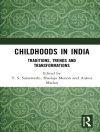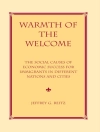The author is a proud sponsor of the 2020 SAGE Keith Roberts Teaching Innovations Award—enabling graduate students and early career faculty to attend the annual ASA pre-conference teaching and learning workshop.
William A. Corsaro’s groundbreaking text, The Sociology of Childhood, discusses children and childhood from a sociological perspective. Corsaro provides in-depth coverage of the social theories of childhood, the peer cultures and social issues of children and youth, children and childhood within the frameworks of culture and history, and social problems and the future of childhood. The Fifth Edition has been thoroughly updated to incorporate the latest research and the most pertinent information so readers can engage in powerful discussions on a wide array of topics.
Jadual kandungan
Preface
About the Author
PART ONE: THE SOCIOLOGICAL STUDY OF CHILDHOOD
1. Social Theories of Childhood
Sociology’s Rediscovery of Childhood
Traditional Theories: Socialization
Interpretive Reproduction: Children Collectively Participate in Society
Language and Cultural Routines
From Individual Progression to Collective Reproductions
Summary
2. The Structure of Childhood and Children’s Interpretive Reproductions
Assumptions of the Structural Perspective
Childhood, Children’s Activities, and Interpretive Reproduction in Peer Culture
Summary
3. Studying Children and Childhood
Macrolevel Methods
Microlevel Methods
Nontraditional Methods in Studying Children
Ethical Issues in Researching Children’s Lives
Summary
PART II. CHILDREN, CHILDHOOD AND FAMILIES IN HISTORICAL AND CULTURAL CONTEXT
4. Historical Views of Childhood and Children
Philippe Ariès’s Centuries of Childhood
The Debate Regarding Grand-Stage Theories of the Family and Childhood
The New History of Childhood
Summary
5. Social Change, Families and Children
Examining Changes in Families From the Children’s Perspective
Children’s Everyday Lives in Families
The Effects of Recent Socioeconomic Changes on Families, Children, and Childhood in Western Societies
The Effects of Recent Socioeconomic Changes on Children and Childhood in Developing Societies
Summary
PART III. CHILDREN′S CULTURES
6. Children’s Peer Cultures and Interpretive Reproduction
Examining Peer Culture from Children’s Perspective
Central Importance of Peer Culture in Interpretive Reproduction
Symbolic Aspects of Children′s Cultures
Material Aspects of Children’s Cultures
Children, Parents, and Consumer Culture
Summary
7. Sharing and Control in Initial Peer Cultures
Central Themes in Children’s Initial Peer Cultures
Friendship, Sharing, and Social Participation
Autonomy and Control in Peer Culture
Summary
8. Conflict and Differentiation in the Initial Peer Culture
Conflict and Peer Relations
Social Differentiation in Initial Peer Cultures
Summary
9. Pre-Adolescent Peer Cultures
Peer Cultures in Preadolescence
Friendship Processes in Preadolescent Peer Cultures
Autonomy and Identity in Preadolescent Peer Cultures
Disputes, Conflict, Friendships, and Gender
Generation M: Electronic Media in the Lives of Preadolescents and Adolescents
Effects and Process of Media Use in the Lives of Preadolescents and Adolescents
Summary
PART IV. CHILDREN, SOCIAL PROBLEMS, AND THE FUTURE OF CHILDHOOD
10. Children, Social Problems, and the Family
Changing Family Structures and Children′s Lives
Work, Families, and Childhood
Divorce and Its Effects on Children
Child Abuse in the Family
Summary
11. Children, Social Problems and Society
Poverty and the Quality of Children’s Lives
Teen Pregnancy and Nonmarital Births
Violence, Victimization, and the Loss of Childhood
The Profound and Inspiring Resilience of Children and Youth in Highly Challenging Life Circumstances
Summary
12. The Future of Childhood
The Major Challenges
Some More Modest Proposals to Enrich Children’s Lives
Conclusion
Glossary
References
Index
Mengenai Pengarang
William A. Corsaro was Robert H. Shaffer Class of 1967 Endowed Chair and is now Professor Emeritus in the Department of Sociology at Indiana University, Bloomington, where he won the President’s Award for Distinguished Teaching in 1988. He was the firstrecipient of the Distinguished Career Award for the Section on Children and Youth ofthe American Sociological Association in 2013. He taught courses on the sociology ofchildhood, childhood in contemporary society, and ethnographic research methods.His primary research interests are the sociology of childhood, children’s peer cultures, the sociology of education, and ethnographic research methods. Corsaro is the author of Friendship and Peer Culture in the Early Years (1985), author of “We’re Friends, Right?” Inside Kids’ Culture (2003), and coauthor with Luisa Molinari of I Compagni: Understanding Children’s Transition From Preschool to Elementary School (2005). He is the coeditorwith Jens Qvortrup and Michael-Sebastian Honig (2009) of The Palgrave Handbook of Childhood Studies. Corsaro was a Fulbright Senior Research Fellow in Bologna, Italy, in1983-1984 and a Fulbright Senior Specialist Fellow in Trondheim, Norway, in 2003.He received an honorary doctorate from Uppsala University, Sweden, in 2016 and wasrecipient of the Cooley-Mead Award from the Social Psychology Section of the American Sociological Association in 2019.












